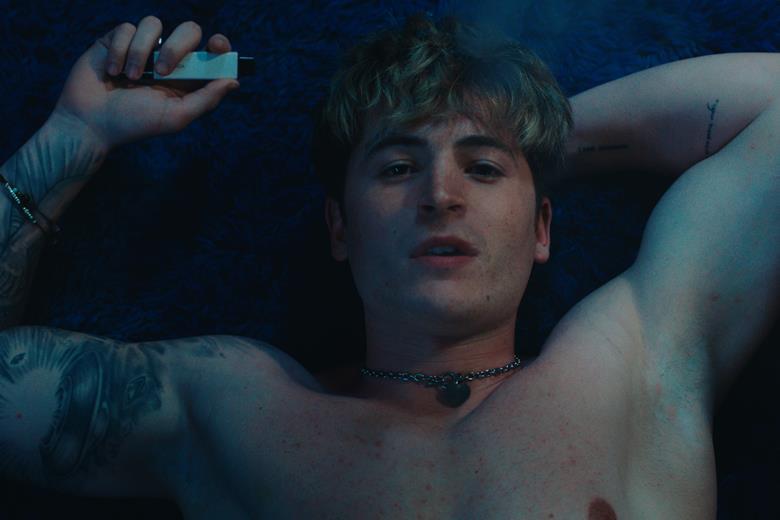Sex sells. Director Elliot Tuttle, like his leading man, is more than aware of that. In what walks the line between a morbid drama and an indelicate erotic thriller, Tuttle places a young sex worker and a mysterious older client in direct opposition. Sex doesn’t scratch the surface of what these two engage in. Pointedly omitted from the programming of many major festivals, Blue Film has become a testament to a willingness to incite discussion and present queerness, even in the absence of moral considerations.
Blue Film, which appropriately makes ample use of blueish tones throughout, follows Aaron Eagle (Kieron Moore) on a night that decisively changes him forever. Eagle is a camboy who exploits his “faggots” — a term which he takes a near-pathological level of pride in using — as “paypigs.” He travels to a stranger’s home in exchange for an agreed-upon $25,000. Already the set-up for a queer psychosexual thriller, Tuttle takes it bounds further. Upon entry to this bizarre house containing an old man in a ski mask, he is presented with a simple request: sit on the couch and answer questions on film. What ensues is a series of tense exchanges and one massive discovery, which draws Eagle back into his past.
In a narrative rife with dialogue primarily concerning itself with the topics of sex work and pedophilia, Tuttle goes too far with his choice to present VHS of footage of actual children in between these, often sexual, exchanges. It evokes a level of disgust far greater than the dialogue between Hank—the ski-masked pedophile revealed to be an ex-teacher—and Eagle does. Home videos, a painting depicting a young boy on the beach, and an extended shot of a child walking past are innocuous on their own (though the painting is pushing it), are intercut with challenging and borderline-nauseating dialogue. In their exchanges, Hank defends his proclivities while making reference to historical “pederasts” and confesses that he’s had his eye on Eagle since he was a student in middle school. Eagle, ever-so brutish, engages Hank without much restraint. Tuttle, who in every other regard exhibits a great sensitivity in this tightrope of a narrative, risks transforming Blue Film into an exploitation film, à la Exploited (2022, dir. Jon Abrahams).
Blue Film is best experienced entirely blind to the plot, or going into it thinking it’s more likely to be a gay guy version of Anora (2025, dir. Sean Baker) or Cam (2018, dir. Daniel Goldhaber). Its inclusion in the NewFest lineup feels almost like a badge of honor for the queer film festival. As Tuttle’s sophomore feature-length film, he comes out of the gates swinging. His first feature, The Steps (2020), reads more as a melodrama and certainly hasn’t generated the buzz of Blue Film.
Actor Reed Birney (Hank) faces his role with an admirable bravado, but do not mistake this for him being cavalier about the topic himself. During the NewFest Q&A, he mentioned that he was scared of whether or not he could play this role. He credits this Birney performs with great courage not only in the “echochamber of perversion” (as Tuttle described it) of detailing Hank’s deepest fantasies, but also in the gratuitous sex scenes. He moves with grace and hesitates during most of the explicit lines — inviting a sort of pity and compassion that momentarily makes one forget he’s a pedophile. Birney imbues the character with a personality befitting British Royalty, although his character is more like Prince Andrew than anything.
While done with a greater level of obvious care, Blue Film’s sex scenes are to the copious amounts of gay men at NewFest what The Hunting Wives’ are to horned-up Netflix users across the globe. For a film that’s meant to arouse both conversation and its viewers, it delivers. Eagle never allows his control to slip. He ensures he is always being serviced despite feeling an obligation to please; he allows Hank to blow him, shave him, and touch him. Among these often-twisted intimate scenes, Eagle masturbating to completion and then rubbing his semen on Hank’s lips while he sleeps is a stand-out. Eagle has allowed Hank to emotionally and physically dominate him up to this point: his trauma has been unearthed, his body has been shaved, and he has reached the point of begging Hank to penetrate him. Yet, in a final show of his hardened camboy persona, he asserts his sexual power over Hank. He treats Hank like the “paypig” he ultimately is.
Moore’s performance is equal parts a facade of jockish confusion and belligerent, emotional responses. His performance is analogous to the dual nature of Tuttle’s writing: eager and pulsing queer sexuality that covers a narrative of pure evil. Eagle appears to be the trauma of his upbringing wrapped in a jagged finish of faux-toughness, demonstrated by his professed pride in “raping faggots” and milking his “paypigs.” His outward personality is pure sex and deception. Blue Film’s opening scene serves as a mild teaser for the ride: Moore stands in his underwear — broadcasting one of his cam shows and showing off his “white ass” for his followers and the audience alike. Eagle and Moore himself are unafraid. The young actor — sheepish, sweet, and surprisingly British — responded to a query during the Q&A with, “I think if we’re constantly afraid to have these conversations that seem uncomfortable, then that’s not the world of cinema that I want to watch.”
With his confronting and sometimes salacious writing, Tuttle makes his care towards his craft evident. Actors, the director, and audiences alike are setting moral misgivings aside and giving discomfort a chance. Will you be giving it one, too?

